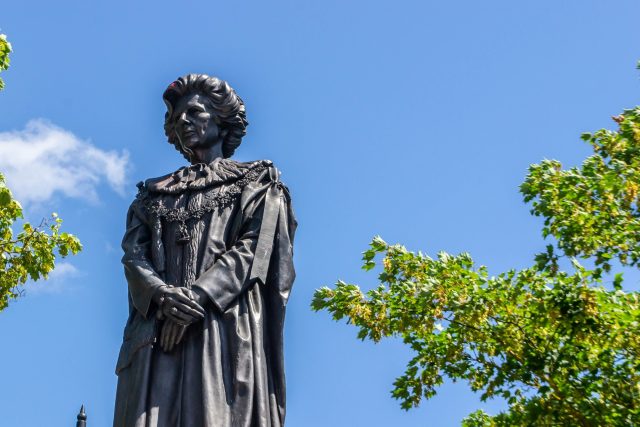
Margaret Thatcher was born on 13 October 1925. Appropriately, the Brussels think tank New Direction is celebrating her centenary in Rome on 11 December, handing out the first Margaret Thatcher Awards. I met Thatcher on several occasions, such as dinners given by the Young Conservatives in London and the Heritage Foundation in Washington DC, and at cocktail parties in the House of Lords at Westminster Palace and at the Estonian Embassy in London. But I only had the opportunity to have a real discussion with her at a dinner in London on 5 October 2002. When she heard that I was from Iceland, she congratulated me on my country not being a member state of the European Union of which she had become increasingly critical. She added that one problem with the European Union was that many people on the continent had never understood the British tradition of liberty under the law. Thatcher was a good-looking woman of average height, with blazing, steel blue eyes, immaculately dressed and with her dark blond hair perfectly coiffed. She had a strong presence, and was more prone to talking than listening. Of the two famous actresses who have portrayed her on-screen, Gillian Anderson looked more like her, while Meryl Streep captured her public personality better.
Liberty under the Law
Thatcher’s remark to me about the English tradition of liberty under the law was profound. Limited government had slowly developed in England, with Magna Carta in 1215, the victory of the Parliament over the king in 1646 and the Bloodless Revolution of 1688. On the continent, however, kings had assumed absolute power in most countries, most notably King Louis XIV of France. The English historian George Macaulay Trevelyan once asked his readers to suppose that the struggle in the seventeenth century between king and Parliament had ended differently. ‘The current of European thought and practice, running hard towards despotism, would have caught England into the stream,’ he wrote. ‘England would then have become a mere outlying portion of the State system of Europe.’ Later, the French Revolution in 1789 had not sought to limit the absolute power of kings, but rather to transfer it to self-declared representatives of the people. This led to terror, a military dictatorship and the sanguinary Napoleonic Wars. It is also a sobering thought that in the spring of 1941, there were only six democracies in Europe, Great Britain, Ireland, Iceland, Sweden, Finland, and Switzerland. Great Britain alone fought the Nazis.
Successful Reforms
Thatcher was a student at Oxford when The Road to Serfdom by Friedrich A. von Hayek came out in 1944, and it made a great impact on her. She was also an avid reader of Hayek’s other works. Shortly after she was elected Leader of the Conservative Party in 1975, she attended a meeting at the Party’s research department. When one of the participants mentioned the ‘middle road’, she reached into her briefcase, took out The Constitution of Liberty by Hayek, held it up, slammed it down on the table and exclaimed: ‘This is what we believe.’ Indeed, when Thatcher became prime minister in 1979, she implemented an ambitious and ultimately successful programme of stabilisation, liberalisation, and privatisation. She revealed the unemployment which hitherto had been hidden in unprofitable companies sustained by government subsidies, the ‘capitalism in the oxygen tent’ in Joseph Schumpeter’s apt phrase. Her ideal was a share-owning democracy where every citizen had a stake.
Fortune Favours the Brave
I was at Oxford in the early 1980s. When one of my teachers, the legal philosopher Ronald Dworkin, in a lecture blamed her for increased unemployment, I raised my hand and asked: ‘But is unemployment in the short term not because of an inflexible labour market, and will it not be reduced in the long term by economic growth?’ Dworkin replied with a broad smile: ‘But it just takes so long.’ In fact, shortly afterwards the economy started growing and unemployment fell. As the Roman playwright Terence observed, Fortes fortuna adiuvat, Fortune favours the brave.



 Subscribe
Subscribe